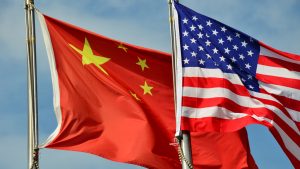 This week I, and just about everybody else holding some interest in sport, or at least in innovative commercials were distracted by the events leading up to, and including, the 58th Super Bowl. Notwithstanding the quickening approach of this Super Bowl Sunday, however, I was drawn to an examination by a number of experts for the Brookings Institution of the US-China relationship.
This week I, and just about everybody else holding some interest in sport, or at least in innovative commercials were distracted by the events leading up to, and including, the 58th Super Bowl. Notwithstanding the quickening approach of this Super Bowl Sunday, however, I was drawn to an examination by a number of experts for the Brookings Institution of the US-China relationship.
So in this somewhat shortened Post, thanks to the Event, I thought I might pay a bit of attention to their useful views.
Graham Allison, one of the experts called on to respond to the question, pointed to the issue posed to the experts:
The invitation from Brookings’ debate organizers asked: “Is the U.S.-China relationship the most consequential bilateral relationship for the United States in the world?
He went on to lay out just why the bilateral relationship is so consequential:
My answer is: yes. If not China, who?
China is:
– one of only two nations that poses an existential threat to the United States.
– the only nation that poses a systemic threat to the U.S. position as the global leader, architect, and guardian of the post-World War II international order.
– the largest emitter of greenhouse gases—accounting for more emissions in 2022 than the United States and Europe combined.
– the second backbone of the world economy: the manufacturing workshop of the world, the No. 1 trading partner of most countries in the world (including the European Union and Japan), and the supplier of most critical items (including everything green and clean) in global supply chains.
– both a classic Thucydidean rival and America’s inseparable, conjoined Siamese twin.
The folks who commented included, as I noted above, Graham Allison, Douglas Dillon Professor – Harvard, and additionally, John Cartin, Adjunct Professor, Walsh School of Foreign Service – Georgetown, Elizabeth Economy, Senior Fellow – Hoover Institutions and Susan Thornton, Senior Fellow – Paul Tsai China Center, Yale Law School, and nonresident fellow, the Brookings Thornton China Center.
It is, for sure, a significant question. After all, the state of the US-China relationship, largely without question, drives the geopolitics of current international relations. And the answers did not fail to satisfy. The assessments by these experts are all very revealing and if you have a moment the answers are worth a read. I say this notwithstanding that not all even saw the relationship as most consequential. In fact Elizabeth Economy promoted a somewhat contrary notion. As she argued:
There are many ways to describe the U.S.-China bilateral relationship. For example, the relationship is the world’s most complex, most challenging, or most competitive. However, the relationship is not “the most consequential in the world for America. Far more consequential is the United States’ relationship with its network of allies and partners in Asia, Europe, and North America. Unlike China, the United States’ allies and close partners share the same values, norms, and strategic objectives. … However, over the almost half-century since the normalization of the U.S.-China relationship, the bilateral relationship has never realized the potential Washington imagined. The two countries’ values, norms, and interests have increasingly diverged, and the ties that have bound them together have increasingly frayed.
In his response, Allison is unwilling to let the Economy argument pass and sets it out his views starkly:
In arguing against the significance of the U.S.-China relationship, both Economy and Cartin duck the reality of China’s existential threat. The brute fact is that China is one of only two nations in the world with nuclear arsenals that constitute genuine “existential” threats—meaning threatening existence.
While not unanimous, then, still I think most would underscore that the US-China bilateral relation is highly consequential. Having said that though, I was most taken with Susan Thornton’s response. Now admittedly I know Susan most of all the experts as she is a key figure in our own China-West Dialogue (CWD). But she argued and targeted exactly what I would have also zoned in on. Susan accepted that the relationship was indeed the most consequential but then targeted what I would have as well: the key to the relationship and its likely impact on the global order is the state of domestic affairs in the US. As Susan argued:
And just to be clear, relations with or actions taken by any other single country will have little consequence for Americans in the world compared to our own decisions and actions. Our fate lies in our own hands. … In short, America cannot escape “China impact.” China is big, capable, changing rapidly, and operating in all priority zones. Still, obsessing over what China does or might do is a mistake that will carry large opportunity costs for America that it cannot afford. China may be the most consequential “other country,” but we need to take responsibility for our own future, a future that will involve “China impact,” but that we can shape.
Absolutely. Couldn’t agree more. In the face of the real possibility of a return of Donald Trump as American President, most anything, and likely everything else pales in comparison to that reality and the real chaos likely to be generated by his return both for domestic and US foreign policy.
Image Credit: MIssouri State University
This Post originally appeared at my Substack, Alan’s Newsletter. https://open.substack.com/pub/globalsummitryproject/p/us-china-relations-how-consequential?r=bj&utm_campaign=post&utm_medium=web&showWelcomeOnShare=true
Feel free to subscribe there and coments are welcome

